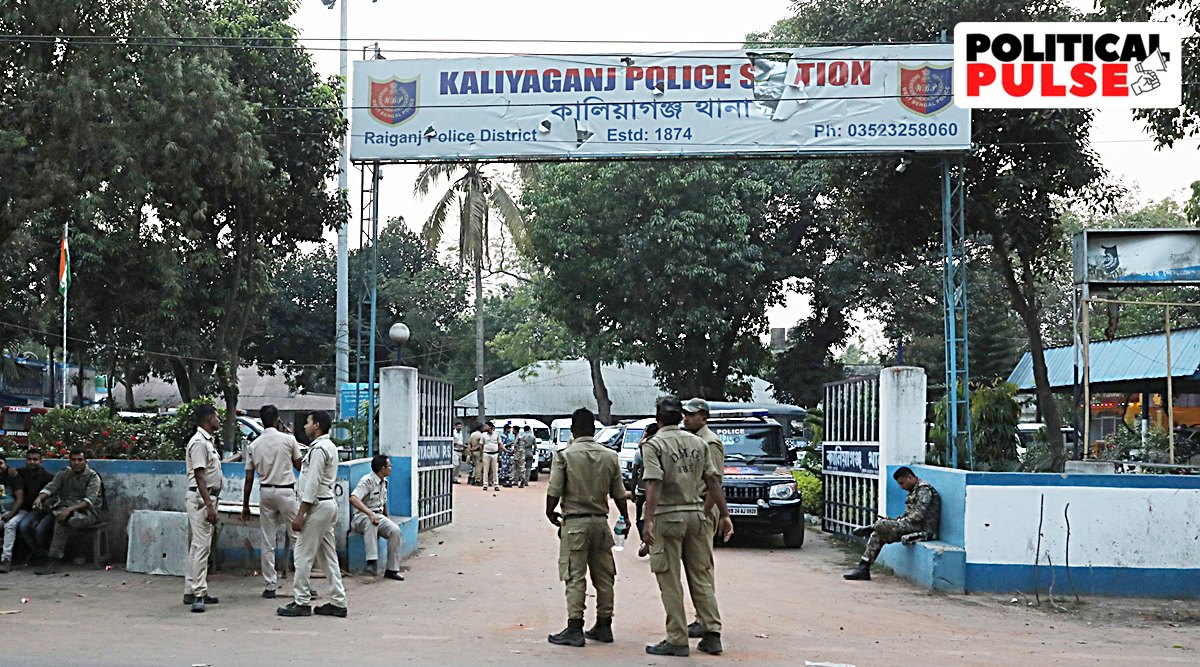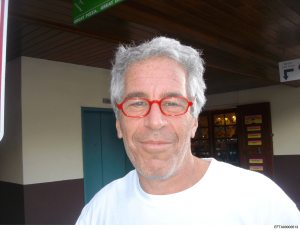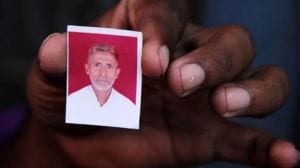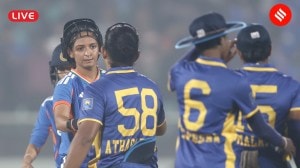Rajbanshis’ salience in Bengal politics surfaces as TMC, BJP lock horns over Kaliaganj flare-up
Both TMC and BJP are set to step up their outreach to Rajbanshi community, which accounts for 30% of North Bengal voters, ahead of coming panchayat and Lok Sabha polls
 A mob set ablaze a portion of Kaliaganj police station after a procession was taken out by the Rajbanshi SC-ST Coordination Committee on Tuesday. (Express photo by Partha Paul)
A mob set ablaze a portion of Kaliaganj police station after a procession was taken out by the Rajbanshi SC-ST Coordination Committee on Tuesday. (Express photo by Partha Paul)
The eruption of violence at Kaliaganj in West Bengal’s North Dinajpur district, with a mob setting ablaze a portion of a police station after a procession was taken out by the Rajbanshi SC-ST Coordination Committee on Tuesday – days after the death of a 17-year-old girl who had been allegedly raped – has again cast a spotlight on the Rajbanshi community.
The population of Rajbanshis or Koch-Rajbanshis is estimated to be over 33 lakh in Bengal, which is mostly concentrated in Cooch Behar, Jalpaiguri, Darjeeling, Malda and Murshidabad districts in northern parts of the state.
The Rajbanshi community accounts for 30 per cent of the electorate in North Bengal and is seen as a key factor in many Assembly seats, especially in over 15 Assembly segments in Cooch Behar and Jalpaiguri districts.
 A portion of Kaliaganj police station was set ablaze after a procession was taken out by the Rajbanshi SC-ST Coordination Committee on Tuesday, days after the death of a 17-year-old girl who had been allegedly raped. (Express photo by Partha Paul)
A portion of Kaliaganj police station was set ablaze after a procession was taken out by the Rajbanshi SC-ST Coordination Committee on Tuesday, days after the death of a 17-year-old girl who had been allegedly raped. (Express photo by Partha Paul)
The community, which has been categorised in Begal among the Scheduled Castes (SCs), also plays a significant role in seven of the eight parliamentary seats in the region.
In the 2019 Lok Sabha polls, riding on Rajbanshis’ support, the BJP won seven Lok Sabha seats in North Bengal.
The community’s support also helped the BJP win 30 of the region’s 54 Assembly seats in 2021 Assembly polls even though the TMC swept the state bagging 213 of 292 seats as against the saffron party’s 77-seat tally.
Traditionally, a majority of Rajbanshis had supported the Left Front government during its 34-year-rule in the state. Later, they shifted their allegiance to the TMC after it came to power in 2011. However, in the 2019 Lok Sabha polls, they flipped in favour of the BJP.
Since then the TMC and the BJP have been vying with each other to woo the community through various moves.
Ahead of the 2021 polls, Chief Minister and TMC supremo Mamata Banerjee announced the formation of three new police battalions, including the “Narayani Battalion” of Cooch Behar, which had been a long-standing demand of Rajbanshis. The BJP-led Centre then conferred the Padma Shri award to Dharma Narayan Barma, a retired teacher from the community.
 Police said the mob also set ablaze some vehicles parked on the premises. (Express photo by Partha Paul)
Police said the mob also set ablaze some vehicles parked on the premises. (Express photo by Partha Paul)
In 2012, one year after coming to power, the TMC government set up the Cooch Behar Panchanan Barma University, named after the 19th century Rajbanshi leader and social reformist.
In February last year, Mamata visited North Bengal, and for the first time attended an event hosted by the Ananta Rai faction of the Greater Cooch Behar Peoples’ Association (GCPA), which has been demanding a separate Cooch Behar state comprising parts of North Bengal. Its other faction, headed by Bangshibadan Barman, has been with the TMC for years.
The Mamata dispensation also declared a holiday on Panchanan Barma’s birth anniversary on February 14.
Given Rajbanshis’ crucial electoral salience in North Bengal, both the TMC and the BJP are set to step up their outreach to the community in the run-up to the upcoming panchayat polls and the 2024 Lok Sabha elections. This explains their raging war of words in the wake of the current Kaliaganj flare-up. While the BJP was quick to demand a CBI probe into the alleged rape-murder of the girl, the TMC camp accused the party of making a bid to polarise the belt.
 Security personnel outside Kaliaganj police station. (Express photo by Partha Paul)
Security personnel outside Kaliaganj police station. (Express photo by Partha Paul)
BJP spokesperson Samik Bhattacharya alleged, “Under the TMC government, atrocities on members of Rajbanshi community are taking place every now and then. Several incidents had taken place in last two years but the state government did not handle the matter with an iron fist. The protest by the community is an outcome of the administration’s failure to address their demands and concerns.”
Hitting back, TMC state general secretary Kunal Ghosh charged that the BJP was trying to instigate the community to gain political dividends. “It is being done in a pre-planned manner. BJP leaders are provoking people through misinformation…. Instead of allowing the police to investigate the matter, they are coming out with their own conclusions. This is being done to influence the administrative process. This is the politics of vultures. They are trying to create an issue out of this tragic incident,” he said.
- 01
- 02
- 03
- 04
- 05































